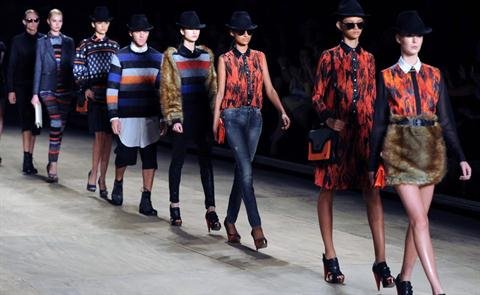AFP
16 янв. 2012 г.
Calls for quotas as black models rare at Rio fashion show
AFP
16 янв. 2012 г.
RIO DE JANEIRO - Only a handful of black models sashayed down the catwalk at this week's Rio fashion show, sparking fresh calls for quotas to ensure greater diversity in a country where more than half of the population is of African ancestry.
 Most of the models on the catwalk for the Rio fashion show were white / Photo: AFP |
Some 24 labels displayed their latest designs at the Rio de Janeiro winter 2012 fashion week, that ran from Wednesday to Saturday, and as in previous years the models were overwhelmingly white.
Yet Brazil, home to 190 million people, has the world's second largest black population after Nigeria.
Organizers refused to address this perennial lack of racial diversity, although in the past they claimed that "there is no racial discrimination" in an industry known for its preference for eurocentric standards of beauty.
For the first time in June 2009, the Sao Paulo Fashion Week (SPFW)-- Latin America's premier fashion event -- imposed quotas requiring at least 10 percent of the models to be black or indigenous.
It acted after strong pressure from black groups and Brazilian prosecutors who blasted the SPFW's longstanding bias towards white models.
Previously, only a handful of black models featured among the 350 or so that sashayed down the catwalk -- usually less than three percent.
"Unfortunately, in 2010, a conservative prosecutor removed the quotas," lamented father David, a Franciscan friar who heads the Educafro non-governmental organization, which lobbies for the rights of blacks and indigenous people on the labor market.
Diversity advocates say show organizers and fashion labels simply ignored the quota and stress that only compulsory rules can bring about lasting changes.
Father David said he had appealed the ruling against the quotas and said a hearing was scheduled for January 15, four days before the scheduled opening of the SPFW.
In education, Brazil already adopted quotas for underprivileged blacks to get into universities.
"You just can't discriminate against blacks in Brazil, where 51 percent of the population is black or mixed-race. I think that the justice system will react favorably to our pressure and this decision will influence the fashion world across the country," Father David noted.
Luana Genot, one of the eight black models out of more 200 employed by the main Rio modeling agency, 40° Models, gave details of the hurdles blacks face.
"They call us only when the the theme of the show is linked to black culture," said the 23-year-old who is also an advertising student at Rio Catholic University (PUC).
"I am often told: What am I going to do with your hair? And for make-up, I am always the last so as not to dirty the brush with overly dark tones," she added.
Last June, during Black Consciousness Week, Genot organized a debate on "ethnic diversity in fashion" at PUC.
"We are told that the winter collection is for whites in Europe or that black women's butts are too big, their hips too wide. I am shocked to see that in Brazil, where more than half of the people are descendants of black slaves, there is so little space for us," she added.
"Brazil's population is very mixed and this must be reflected in fashion," Genot said.
"The fashion weeks are cruel for Rio models who are curvier and tanned," Sergio Mattos of 40° Models told the O Globo daily.
Thus, Bruna Loureiro, a blue-eyed blonde, was dropped from a show because her skin was found to be "too golden" while the label wanted "very pale skins."
The debate on quotas even found its way into the popular "Big Brother Brasil" reality show on Wednesday night.
Asked about the need for quotas in the show, Daniel Echaniz, a professional model and the only black among the 12 contestants, said he was "against", a minority view among blacks but one which is backed by those who think "it (quotas) exacerbates racism".
by Claire de Oliveira
Копирайт © 2024 AFP. Все права защищены. Любая информация даннного раздела защищена законом об интелектуальной собственности и не может быть скопирована, перепечатана, изменена, издана или использована в коммерческих целях.

























